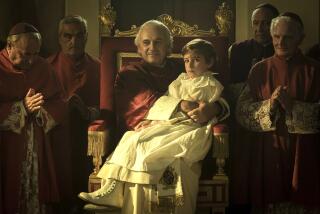MOVIE REVIEW : ‘Household Saints’ in Little Italy: A Spiritual Enigma
- Share via
Most movies are locked into a single mood from the first shot but “Household Saints,” directed by Nancy Savoca from Francine Prose’s novel, moves gracefully from knock-about high spirits to a kind of austere sublimity. It’s a difficult movie to get a fix on, but the difficulty is what makes it special.
The shifts in tone correspond to its portrayal of three generations of Italian-American women in New York’s Little Italy following World War II. The three women are temperamentally and spiritually quite different from one another and yet they form a triumvirate: They are each indomitable in their own way.
Carmela (Judith Malina) is the deeply superstitious mother of Joseph Santangelo (Vincent D’Onofrio), the neighborhood butcher, who wins his 17-year-old wife, Catherine (Tracey Ullman), in a pinochle game. Carmela has more than the usual mother’s suspicions about her new daughter-in-law; in between schooling her in domestic chores and teaching her the family secret of sausage making, she casts a dim eye on her pregnancy and considers the woman bad luck.
Carmela is like a creature out of urban folklore, and Malina makes her rituals and fears shockingly alive. Her conversations with her dead husband aren’t jolting because she lives in a continuum of fantasy anyway. Catherine, who is brought into the family as a rather simple, down-to-earth woman, lives outside Carmela’s continuum and yet she’s drawn into the old woman’s way of seeing.
When Catherine and Joseph have a daughter, Teresa (Lili Taylor), the film settles into a tone of easygoing domesticity for a while. But Teresa turns out to be as fanatic in her way as Carmela--it’s just that she’s much more blissed-out about it. As a child in Catholic school she accepts with wide-eyed wonder the stories of visits by Our Lady of Fatima. Later, she wins first prize for an essay “Why Communism Is the Anti-Christ.” She wants to join a nunnery but her father is incensed at the idea. (He would much rather she marry a nice Catholic boy than Christ.)
Teresa moves inexorably out of her parents’ realm--out of her earthly realm altogether--but Savoca keeps her case deliberately ambiguous. She regards Teresa’s devotionalism as eerie, possibly insane, and yet in touch with the miraculous. And she manages to give Teresa her due while at the same time doing the same for her parents. Their concern has its gravity, and the most touching moments in the film are those in which Catherine, who has no affinity for the spiritual, tries to embrace her daughter. (Tracey Ullman makes us see that Catherine’s effort is, in its way, a spiritual gesture.)
Savoca, with her co-screenwriter Richard Guay, doesn’t bring out enough of the richness in this generational saga (rated R for scenes of sexuality). It moves gracefully from moment to moment but Teresa’s story leaves a chill, and the lives of some of the characters, particularly Catherine, are skimped. It’s genuinely unsettling, though, and that counts for something. It’s trying to perplex audiences in new ways.
‘Household Saints’
Tracey Ullman: Catherine Falconetti
Vincent D’Onofrio: Joseph Santangelo
Lili Taylor: Teresa
Judith Malina: Carmela Santangelo
A Jonathan Demme presentation of a Fine Line Features release. Director Nancy Savoca. Producers Richard Guay. Executive producer Jonathan Demme. Screenplay by Nancy Savoca and Richard Guay. Cinematographer Bobby Bukowski. Editor Beth Kling. Costumes Eugenie Bafaloukas. Production design Kalina Ivanov. Art director Charles Lagola. Set designer Jeff McDonald. Set decorator Karen Wiesel. Running time: 1 hour, 49 minutes.
MPAA-rated R (scenes of sexuality).
More to Read
Only good movies
Get the Indie Focus newsletter, Mark Olsen's weekly guide to the world of cinema.
You may occasionally receive promotional content from the Los Angeles Times.







